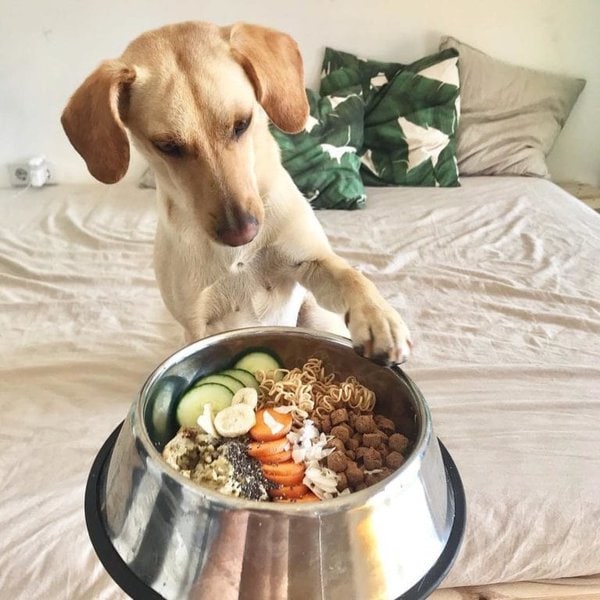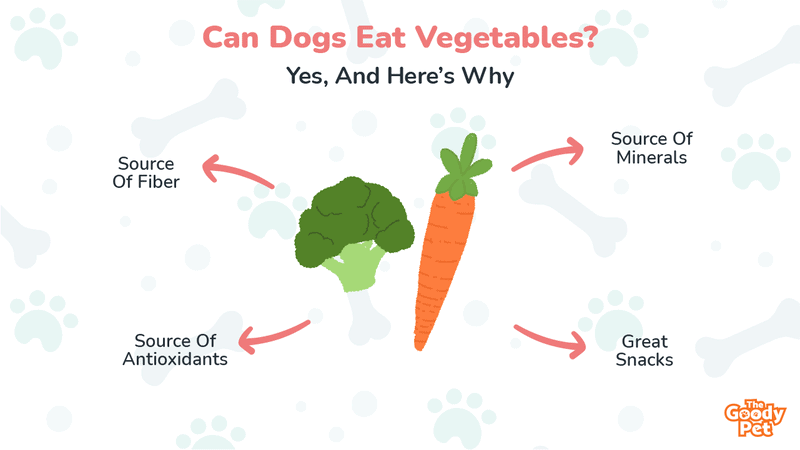Dogs are obligate carnivores. This means that they need to eat meat to survive. However, this does not mean that there is no room for fruits and veggies in their diet.
Dogs can and should eat vegetables. There are several examples of veggies that are both nutritional and safe for dogs. They include:
- Broccoli
- Carrots
- Brussel sprouts
- Green beans
- Spinach
- Pumpkin and more…
This list of vegetables that you can feed your dog is in no way exhaustive. There are many other vegetables that your dog can safely enjoy and benefit from. Let’s take a closer look at some of these.
What Vegetables Can Dogs Eat Everyday?
Dogs should definitely eat vegetables every day in which case options like pumpkin, spinach, and many other greens should be made diet staples. These are not only great sources of micronutrients but also fiber for digestive health.
So, in this section, we shall explore what vegetables dogs can eat every day and what does your pooch have to gain from each particular vegetable.
Brussel Sprouts
Brussel sprouts make for a healthy snack for dogs. They can also be added to freshly prepared dog food.
Brussel sprouts are a fantastic source of antioxidants which are important for the dog’s general health and well-being.
Celery
Celery may not be the kind of vegetable you would ever imagine a dog munching on but it is definitely worth considering as a potential addition to your dog’s diet.
In addition to all the vitamins, minerals, and fibers that celery brings to the table, this vegetable also helps with naturally freshening the breath.
Pumpkin
Technically speaking, pumpkins are not vegetables. However, they are often grouped in with their leafy counterparts and definitely have a place in your dog’s diet. Pumpkin flesh is rich in fiber which your dog will need for a healthy and optimally functioning gut.
The best part is that it can easily be mushed up and added to both dry or wet dog food. You may also find it a lot with commercially prepared dog foods as a key ingredient.
Spinach
Spinach is a source of minerals like calcium, iron, magnesium and potassium. All these play important roles in different body functions from blood formation to muscle contraction.
Spinach also has numerous vitamins. The most important of these are vitamin A for your dog’s eyesight, folate for different metabolic processes, and vitamin C for immune health.
In a typical spinach dish, one would have easily thought about adding carrots or other vegetables to go along. Will carrots work for your beloved pooch? What other vegetables will work or not work for dogs?
And how should we cook these vegetables mentioned here in this article so that dogs will safely enjoy and benefit greatly from? We’ll explore these questions further in the later sections.
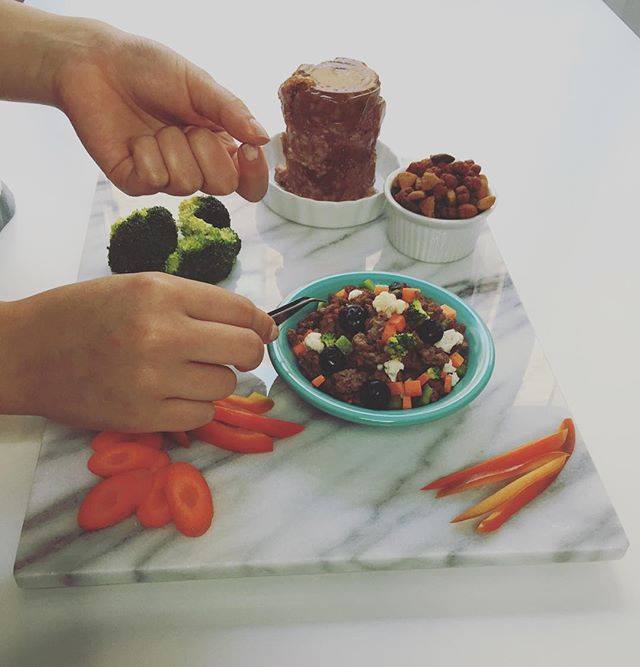
Are Carrots Good For Dogs?
Carrots are fantastic for your dog for many reasons. The first awesome perk of adding this vegetable to your dog’s diet is the fact that it is very versatile. It can be given raw as a snack or boiled and added to wet food preparations.
As with most other dog-friendly vegetables, carrots are also often found as key ingredients in dry dog food.
Another key benefit of giving your dogs carrots is access to both micronutrients and fiber. The most notable of these is Vitamin A which is present in large amounts in carrots. This will help with developing and functioning of the eyes for great night vision in your dog.
Finally, you will also appreciate the fact that carrots can serve as a helper when it comes to maintaining oral hygiene for your dog. Here, just give the pooch the carrots as raw snacks. They are hard enough to at least mechanically get rid of plaque without hurting the dog
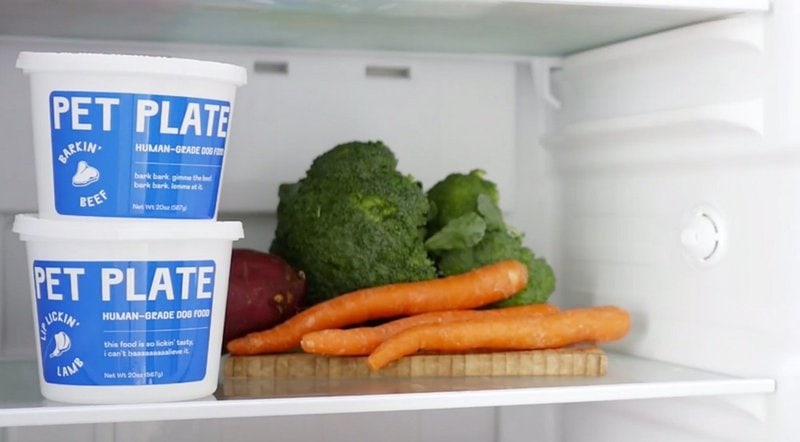
Is Broccoli Good For Dogs?
Broccoli is awesome for dogs and they love it as well. The super crunchy vegetable adds a nice textural dimension to soft dog food and is thus an ideal food topper. In these cases, all you have to do is boil some, chop them up into bite-size chunks and add to the dog’s food.
Broccoli is very rich in antioxidants and natural anti-inflammatory agents. These will come in particularly handy for dogs with health issues but is also useful for healthy dogs. Broccoli is also a good source of protein, fiber, and even water as it is 90% water.
While broccoli is generally considered safe for dogs, too much of this vegetable can cause digestive tract irritation. To avoid these issues, just play it safe by limiting the amount of broccoli you give the dog to less than 10% of their daily food intake.
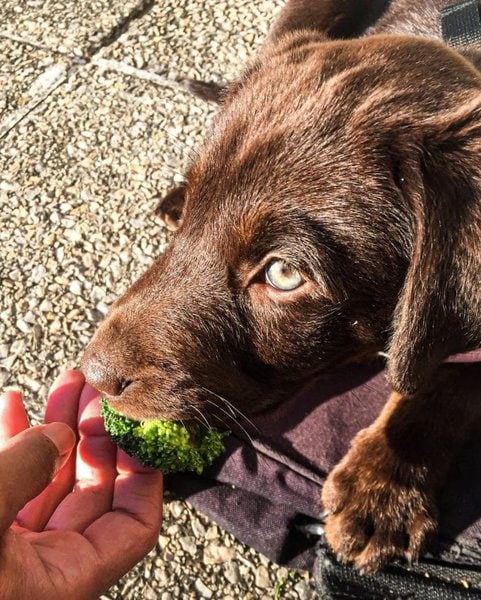
What Are The Best Vegetables For Dogs To Eat?
The best vegetables for a dog to eat have a combination of features including safety for the dog, high nutritional value, and palatability. They also need to be versatile in terms of possible preparations and serving suggestions to fit into the dog’s diet.
Here is a quick summary of the best vegetables for your pooch covered in this article so far:
- Broccoli
- Peas
- Carrots
- Green beans
- Pumpkin
- Brussel sprouts
- Kale
- Celery
- Cucumber
These are just some of the most common vegetables that you can safely feed your dog. If you are interested in something a bit more exotic or hard to come by, it is best to consult your vet on whether or not it would be safe for your pooch.
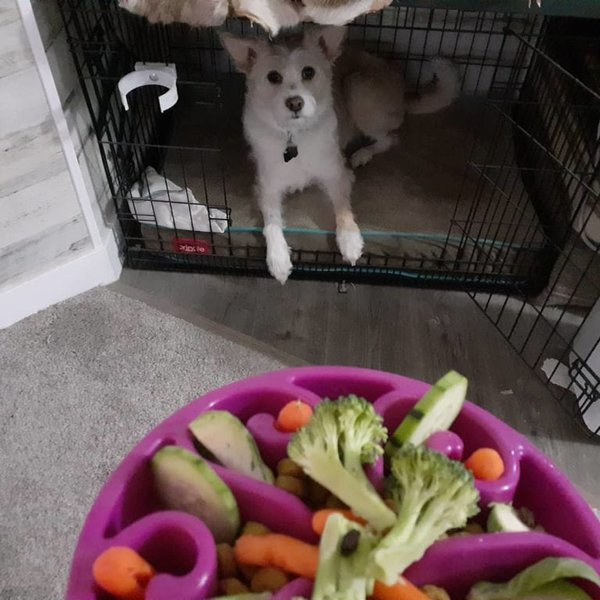
What Vegetables Are Bad For Dogs?
Vegetables that cause toxic systemic effects or gut irritation are bad for dogs. In some cases, the effects will be immediate and are usually as a result of an upset gut. You may notice your dog vomiting, experiencing diarrhea, and in general discomfort.
A few others cause more long-term damage. With these vegetables, the toxicity is silent for months or even years and mainly affects other systems and organs outside the gut including the kidneys and the liver.
To help you keep your doggy safe, here are some vegetables that have been proven to be toxic to dogs and to be avoided at all cost.
- Onions
- Unripe tomatoes
- Garlic
- Rhubarb
- Raw potatoes
- Baked beans
This is another list that is not exhaustive. You also have to steer clear of toxic fruits including grapes and raisins as well as human treats like chocolate and alcohol.
It is also crucial that you appreciate the fact that some of the good vegetables may at times be toxic to the dog. This happens with vegetables like spinach and broccoli if the dog eats too much of the same.
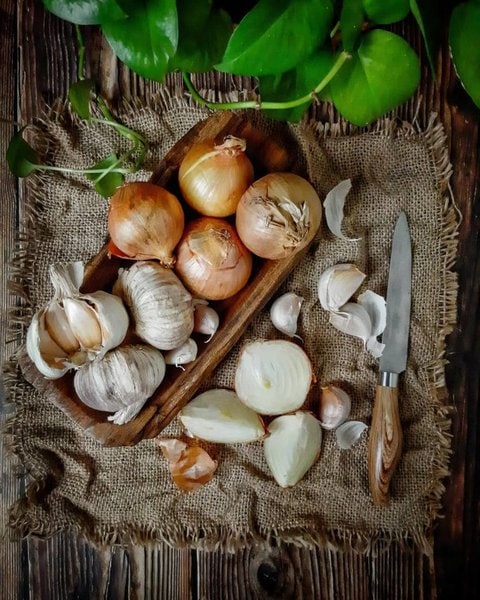
Are Raw Potatoes Bad For Dogs?
Raw potatoes are very bad for dogs and can be life-threateningly toxic in large amounts. In addition to their unpleasant texture and complete lack of flavor, raw potatoes contain high levels of a toxic compound known as solanine.
Solanine is the same compound found in other fruits and vegetables like grapes which are considered toxic to dogs. When consumed, it causes both gut irritation and systemic toxicity with consequences including:
- Stomach upset with vomiting
- Lethargy
- Tremors due to nervous system involvement
- Renal toxicity
- Difficulty breathing
Interestingly, cooked potatoes do not have the same effect and are actually good for dogs. The cooking process significantly reduces the amount of solanine in the potatoes making them safer for the dog to consume.
For your dog’s safety, it is also best to get rid of sprouts, green or purple spots, and to fully peel the potato even if you plan on cooking it.
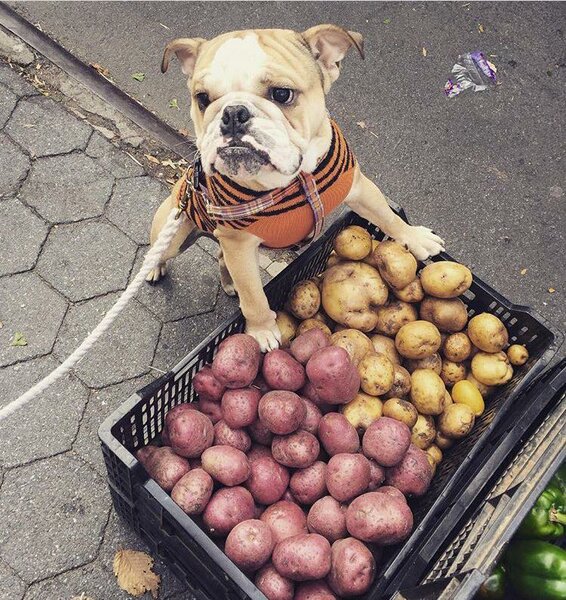
Are Onions Bad For Dogs?
Onions are bad for dogs and are among the most commonly implicated causes of food toxicity in dogs. This is true for all types of onions and their relatives including garlic, shallots, leeks, and chives just to name a few. The ban on onions for dogs also includes onion powder.
Onions contain a toxic compound known as N-propyl disulfide. This compound primarily targets blood cells and causes anemia in the dogs. As a result, you may not really notice the harmful effects until later on in the disease process.
Anemia in dogs will present in different subtle ways including reduced energy levels, difficulties in breathing, and loss of appetite. You may also notice surfaces like paw pads, the nose, and oral mucosal surfaces appear much paler than before.
The problem with onions is that they are sometimes so well cooked that you may not even realize the human food you are letting your beloved pooch taste contain onions. To avoid instances of accidental consumption, it is best to avoid feeding your dog off your plate.
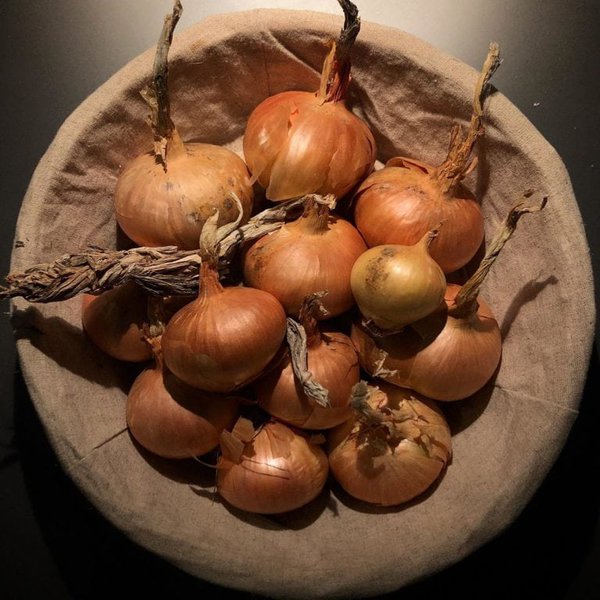
Are Tomatoes Bad For Dogs?
Tomatoes are both good and bad for dogs. It all depends on whether they are ripe or unripe. It also depends on the part of the tomato plant that you are considering feeding your dog.
The tomato plant is rich in a toxic compound known as solanine. This is the same compound found in raw potatoes that is responsible for the toxic effects that the dog suffers. The compound is found in the leaves, stems, branches, and unripe fruit on a tomato plant.
As the fruit ripens, the concentration of solanine reduces drastically to a point where the tomato is actually safe for dogs to eat.
Ripe tomatoes have a lot to offer your dog in terms of nutritional value. This includes vitamins like C, K, and several from the vitamin B group. Tomatoes also provide potassium and sodium that are necessary for healthy running of the nervous system.
Ripe tomatoes are also refreshing and tasty and thus make for a fantastic snack or treat.
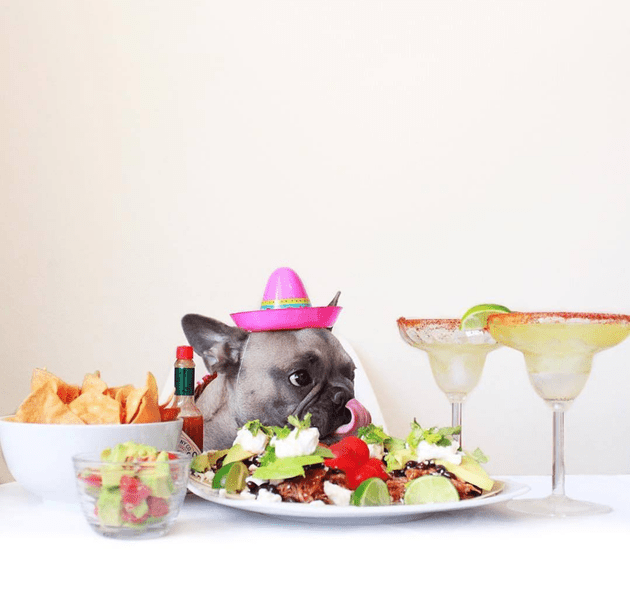
Can You Give A Dog Baked Beans?
Dogs should never eat baked beans. While boiled and unseasoned beans may actually be good for your dog, the baked and preserved kind can be very toxic.
The main reason for this distinction is the fact that baked beans are prepared with numerous ingredients that may not be safe for the dog. These include ingredients like onions and garlic that are often added for flavor. It also includes tomatoes in the soup base that holds the beans.
In addition to these potentially toxic ingredients, baked beans are bad for dogs due to their high sugar intake. This can result in metabolic derangements as well as issues like obesity.
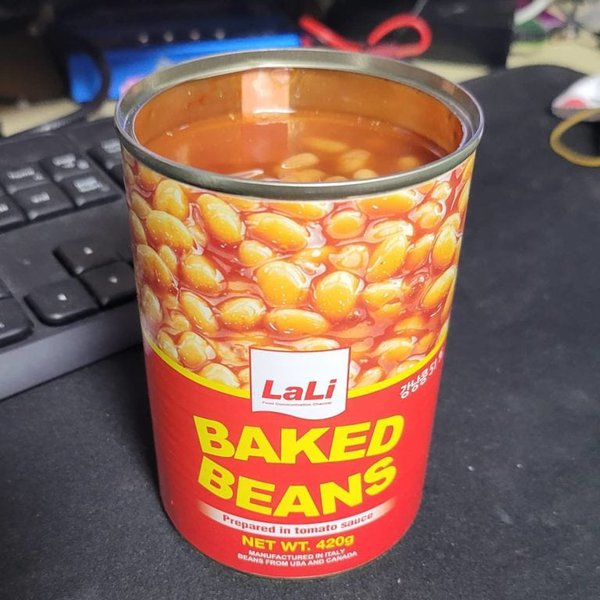
Are Raw Or Cooked Vegetables Better For Dogs?
Both raw and cooked vegetables have something to offer your dog with the exception of potatoes and a few other veggies. For those that are safe either way, whether or not you should cook vegetables depends on your priorities and what your dog likes better.
Cooked vegetables offer the benefit of versatility in terms of how you can serve them to your dog. You can chop or mush them up and add to wet dog food. You can puree the veggies and feed them directly especially to young puppies.
Raw vegetables, on the other hand, are ideal for serving up as snacks. Hard veggies like carrots and celery are best served this way. In addition to being fun for the dog to crunch on, raw vegetables can be used as a way to help keep your dog’s teeth and mouth clean.
Then what about vegetables in their frozen forms? Is it safe for dogs to consume such vegetables upon thawing?
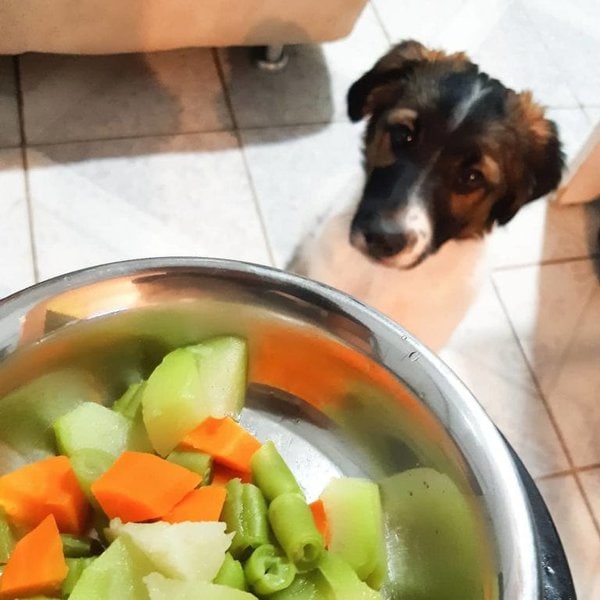
What Frozen Vegetables Are Good For Dogs?
Frozen vegetables are indeed safe and beneficial for dogs to consume! In fact, they are second only to freshly prepared vegetables in their nutritional value and overall safety for the dog.
Some of the most common frozen vegetables that you can safely give to your dog include peas, green beans, and even broccoli.
The most important thing to consider when choosing frozen vegetables is the preservation details. The best options are those that are frozen while fresh with no preservatives or additives.
You also have to ensure that the vegetables are generally safe for the dog even in their fresh state.
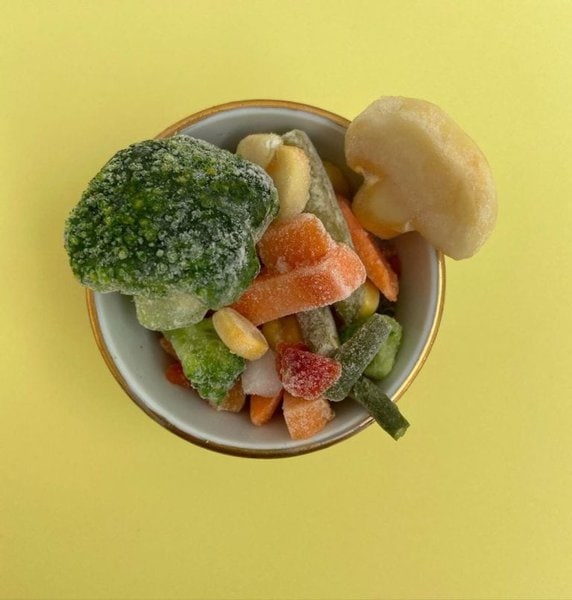
What Veggies Can I Add To My Dogs Food?
If you want to add vegetables to dog food, it is best to go with veggies that have similar consistency.
You can add things such as carrots, broccoli, or celery to dry dog kibble. Here, the crunchy texture of the vegetables blends well with that of the kibble. That way, picky eaters will not notice and avoid the food.
If your dog is on wet dog food, you can go with softer vegetables including leafy greens like kale and spinach, peas, unpreserved beans, and ripe tomatoes. You can also add the crunchy veggies for a bit more of an enjoyable bite for dogs that may not be able to handle very hard kibble.
